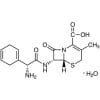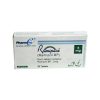Secnidazole | Nitroimidazole | An Antibacterial and Antiprotozoal Agent
Introduction:
Secnidazole avaiable under the brand name of Secnidal, Dysen is an antibacterial and antiprotozoal agent used for treating bacterial and protozoal infections. It belongs to the nitroimidazole group of drugs, which work by inhibiting the growth and replication of bacteria and protozoa. This drug is available in the form of tablets and is prescribed by doctors for the treatment of a wide range of infections.
In this article, we will discuss the uses, side effects, dosage, precautions, and interactions of Secnidazole tablets.
Uses:
Secnidazole tablets are mainly used for the treatment of bacterial and protozoal infections such as:
Bacterial vaginosis: This is a common vaginal infection caused by an overgrowth of bacteria in the vagina. Symptoms include a fishy odor, vaginal discharge, and itching.
Trichomoniasis: This is a sexually transmitted infection caused by a parasite called Trichomonas vaginalis. Symptoms include vaginal discharge, itching, and pain during sex.
Giardiasis: This is an intestinal infection caused by a parasite called Giardia lamblia. Symptoms include diarrhea, stomach pain, and nausea.
Amoebiasis: This is an intestinal infection caused by a parasite called Entamoeba histolytica. Symptoms include diarrhea, stomach pain, and fever.
Secnidazole tablets are also used for the treatment of other infections caused by anaerobic bacteria, such as dental infections, skin infections, and respiratory tract infections.
Side Effects:
Like all drugs, Secnidazole tablets may cause side effects. The most common side effects include:
Nausea
Headache
Dizziness
Diarrhea
Abdominal pain
Vomiting
If any of these side effects persist or worsen, you should contact your doctor immediately.
Less common but more severe side effects of Secnidazole tablets include:
Allergic reactions such as hives, difficulty breathing, or swelling of the face, lips, tongue, or throat.
Seizures or convulsions
Neuropathy
Peripheral neuropathy
Leukopenia
Stevens-Johnson Syndrome
If you experience any of these symptoms, you should seek medical attention immediately.
Dosage:
The dosage of Secnidazole tablets depends on the type and severity of the infection. It is important to take the tablets exactly as prescribed by your doctor. Do not take more or less than the recommended dose.
For the treatment of bacterial vaginosis, the usual dosage is one 2-gram tablet of Secnidazole taken orally once daily for 2 days.
For the treatment of trichomoniasis, the usual dosage is one 2-gram tablet of Secnidazole taken orally as a single dose.
For the treatment of giardiasis, the usual dosage is one 2-gram tablet of Secnidazole taken orally once daily for 3 days.
For the treatment of amoebiasis, the usual dosage is one 2-gram tablet of Secnidazole taken orally once daily for 3 days.
Precautions:
Before taking Secnidazole tablets, it is important to inform your doctor if you have any medical conditions or allergies. You should also inform your doctor of any other medications or supplements you are taking.
Secnidazole tablets may not be suitable for everyone, and your doctor may need to adjust the dosage or prescribe an alternative medication if you have:
A history of allergic reactions to nitroimidazole drugs
Blood disorders
Liver disease
Kidney disease
Seizures or epilepsy
Secnidazole tablets should not be taken during pregnancy or while breastfeeding.



